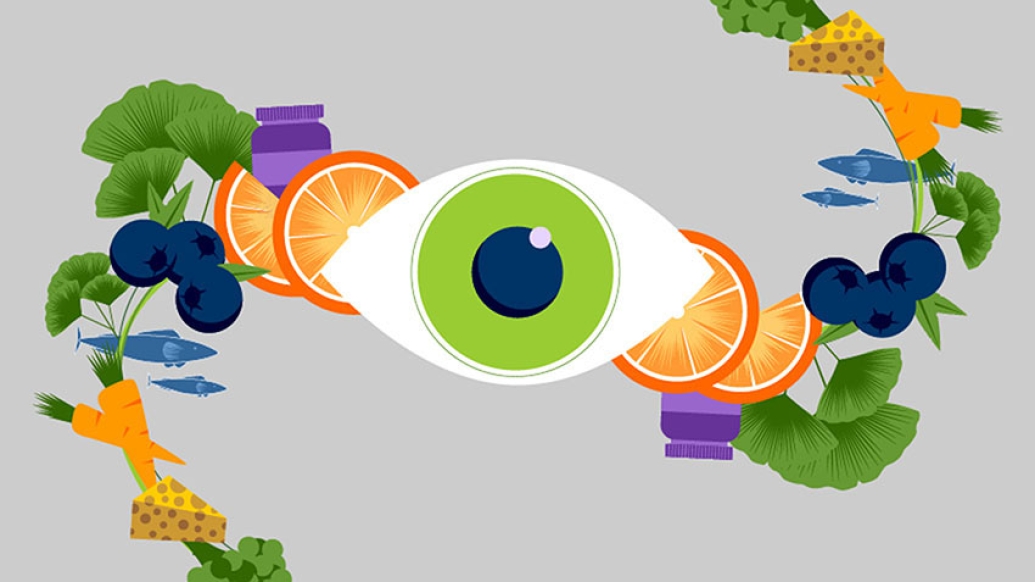Kellogg Eye Center ophthalmologists explain which vitamins and supplements are actually good for your eyes.
1:00 PM
Author |

You've probably heard someone say, "Eat your carrots, they're good for your eyes." You may have also seen advertisements for nutritional supplements for eye health.
What minerals and vitamins benefit your eyes most?
LISTEN UP: Add the new Michigan Medicine News Break to your Alexa-enabled device, or subscribe to our daily updates on iTunes, Google Play and Stitcher.
A few nutrients can help maintain eye function, protect against harmful light and reduce the development of age-related degenerative diseases of the eye.
But more research is needed to help eye care professionals advise patients on whether they should regularly take a supplement.
"In most cases, these studies are of short duration and are too variable for us to make any solid conclusions," says Adrienne West, M.D., a comprehensive ophthalmologist at the University of Michigan Kellogg Eye Center.
Paula Anne Newman-Casey, M.D., a Kellogg glaucoma specialist, says studies also need to be thorough and include comparisons between those who take eye supplements and those who don't.
While few studies support positive claims about supplements, the age-related eye disease study (AREDS) is an exception. The research showed a group getting a specialized blend of vitamin and mineral supplements had a 25 percent lower risk of worsening of age-related macular degeneration.
SEE ALSO: 7 Healthy Habits to Help Prevent Macular Degeneration
An eye doctor can determine if AREDS supplements, a combination of vitamins C and E, lutein, zeaxanthin, copper and zinc, will be effective, given the status of your eye health.
But the promising study, conducted in the 1990s, sparked interest in the use of supplements for protecting eyesight.
Kellogg ophthalmologists discuss which vitamins and supplements could help keep your eyes in check.

Vitamin A
Without high enough levels of vitamin A, the conjunctiva – which is normally clear – can develop a white spot called a Bitot's spot. Vitamin A deficiency can impair night vision and lead to blindness, although that's rare in the United States.
With the right vitamin supplements, most vitamin A deficiency cases are easy to treat, says West.
And, here's where the benefits of carrots come in: they are packed with beta carotene, which the body absorbs and converts into vitamin A. Egg yolks, cheese, broccoli and liver are also good sources of vitamin A.

Vitamin C
A diet rich in vitamin C has been shown to reduce the risk for cataract progression. Unfortunately, you can't completely avoid cataracts, which naturally occur with age, but eating foods high in vitamin C may delay their onset and keep cataracts from worsening.

Bilberry (Vaccinium Myrtillus)
Bilberry, which looks similar to a blueberry, has gained a reputation for improving night vision. But bilberry can interact with aspirin and other products containing ibuprofen and result in thinning of the blood and bleeding problems during surgery. It's important to let your physician know what supplements or drugs you're taking, says Newman-Casey.
"Physicians need to be aware of all your medications, including supplements, to best advise if you're at risk for a harmful drug interaction," she says.

Gingko Biloba Leaf Extract
Eye pressure is the name of the game in glaucoma treatment, but gingko supplements may help improve blood flow and improve vision.
More long-term studies are needed to determine if gingko has any proven effect on visual field, Newman-Casey says.
If you're thinking of taking gingko biloba for your eyes, remember the leaf extract is loaded with more antioxidants than raw gingko seeds.

Omega 3 Fatty Acids
When it comes to omega 3 fatty acids, found in fish, such as tuna, mackerel and salmon, flaxseed oil, walnuts and all green leafy vegetables, Americans don't consume nearly enough. DHA, a type of omega 3 fatty acid, has a role in reducing inflammation and helping cells in the retina heal and regenerate after damage from light exposure and aging.
MORE FROM MICHIGAN: Sign up for our weekly newsletter
But a well-controlled trial revealed omega-3s found in fish oil supplements were no better than the placebo for treating dry eyes.

Do you need supplements?
Your diet should always be your primary source for obtaining vitamins and minerals for your body. Maintaining a healthy lifestyle and eating antioxidant-rich foods can help protect against cellular damage and could contribute to improving your eye health.
However, the National Eye Institute says the high levels of vitamins and minerals tested in AREDS is difficult to achieve from diet alone.
If taking a supplement, Newman-Casey advises patients to look for the USP label, which evaluates a product's quality, purity and potency.

Explore a variety of health care news & stories by visiting the Health Lab home page for more articles.

Department of Communication at Michigan Medicine
Want top health & research news weekly? Sign up for Health Lab’s newsletters today!





